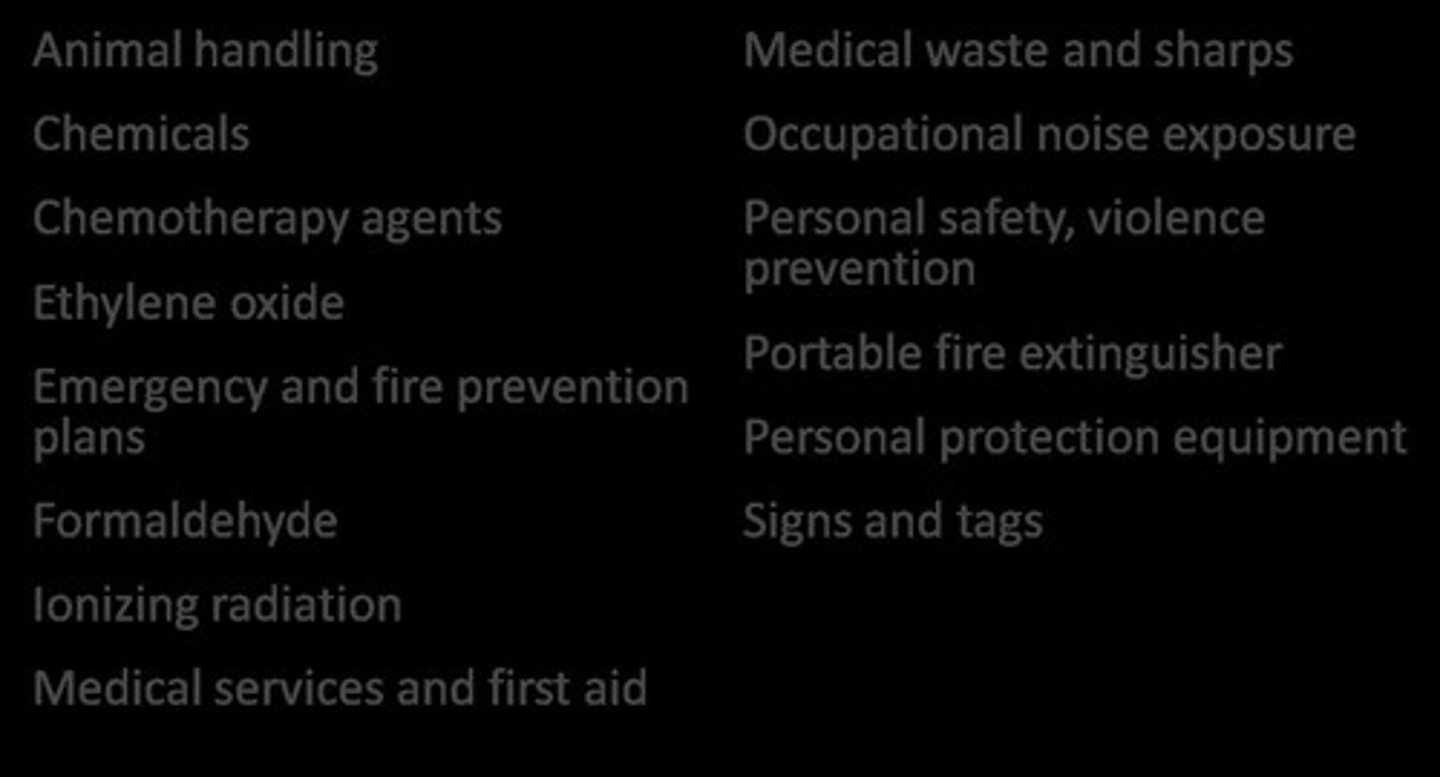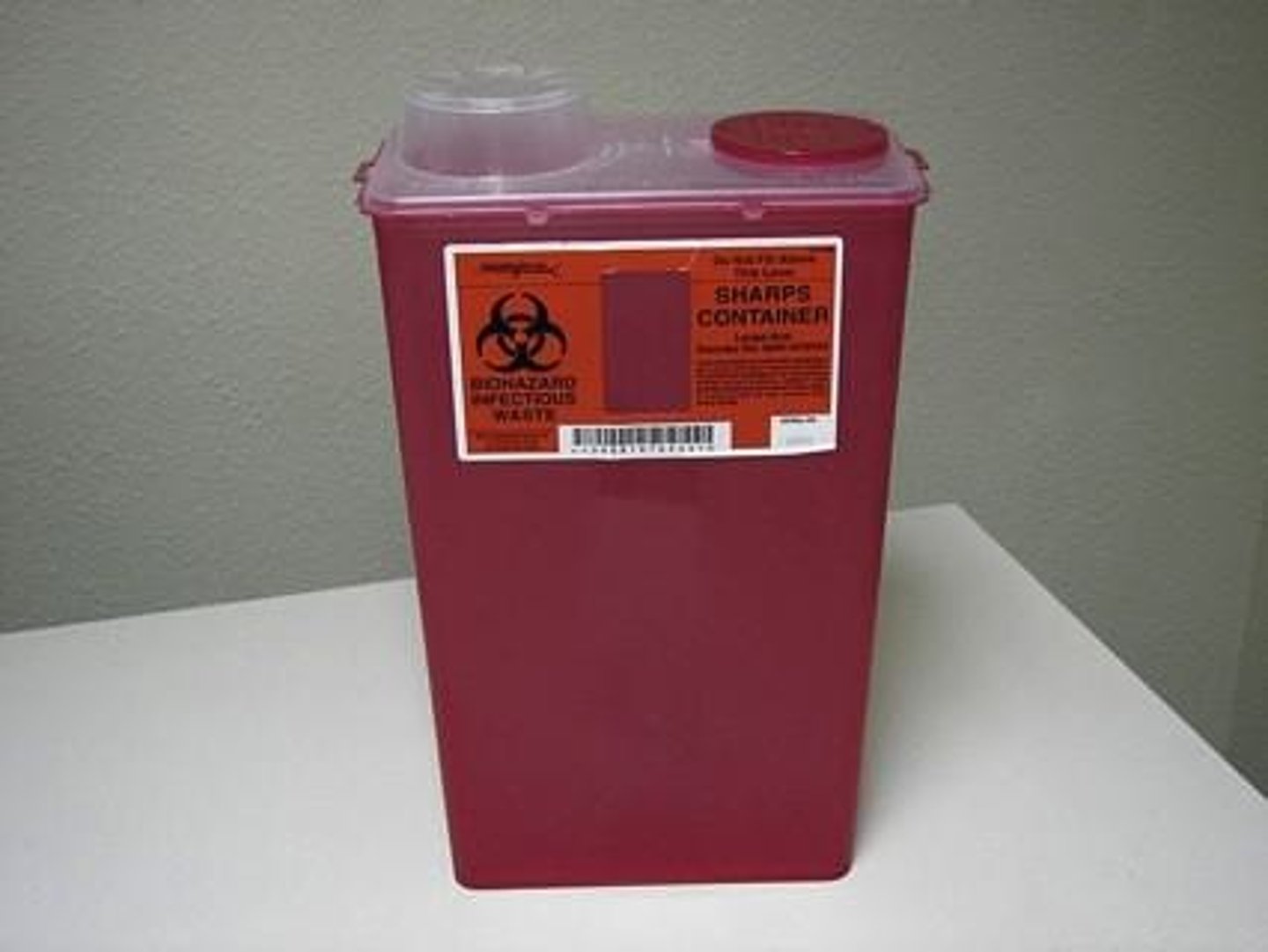OA: Safety in the Veterinary Practice
1/114
There's no tags or description
Looks like no tags are added yet.
Name | Mastery | Learn | Test | Matching | Spaced |
|---|
No study sessions yet.
115 Terms
Zoonotic diseases
Diseases transmitted from animals to humans.
Physical hazards
Risks from environmental factors causing injury.
Chemical hazards
Risks from exposure to harmful substances.
OSHA
Regulatory body ensuring workplace safety standards.
Employer responsibilities
Duties to provide safe work environments.
Employee responsibilities
Obligations to follow safety protocols and report hazards.
Workplace Rights Poster
Document outlining employee safety rights and responsibilities.
Personal Protective Equipment (PPE)
Gear designed to protect employees from hazards.
Hazard Communication Standard
Regulation ensuring employees are informed about hazards.
Safety manager
Designated employee responsible for safety training.
Safety program
Structured plan to maintain workplace safety.
SDSs
Safety Data Sheets detailing chemical hazards.
Emergency evacuation protocol
Plan for safely exiting during emergencies.
Training program
Instruction on PPE use and hazard awareness.
Inspections
Evaluations of workplace safety compliance.
Written plan
Document listing potential hazards and safety measures.
Hazardous chemicals
Substances posing risks to health or safety.
Labeling system
Method for identifying chemical hazards on containers.
Unannounced inspections
Surprise evaluations to assess safety compliance.
Credential verification
Process of confirming inspector's qualifications.
Immediate treatment
Prompt medical care for reported injuries.
Diagram of hazards
Visual representation of potential workplace risks.
Air quality evaluation
Assessment of ventilation and air circulation.
Hazard Analysis
Evaluation of facility for safety risks.
Personal Protection Equipment (PPE)
Gear required for employee safety during work.
Disease Reservoir
Environment essential for disease replication.
Direct Transmission
Infection spread through close contact.
Indirect Transmission
Infection spread via intermediaries.
Vector
Living organism transporting infectious agents.
Vehicle Transmission
Infectious agent spread via food or water.
Airborne Transmission
Infection spread through dust or droplets.
Control of Zoonotic Diseases
Preventative measures against animal-borne diseases.

Animal Bites
Wounds causing bleeding and potential infection.
Common Bacterial Infections
Infections like Pasteurella and Staphylococcus from bites.
Electrical Safety
Precautions to prevent electrical hazards.
Emergency Lighting
Lighting for safe evacuation during emergencies.
Fire Alarms
Devices to alert occupants of fire danger.
Smoke Alarms
Sensors detecting smoke to prevent fires.
Extension Cords
Temporary wiring for electrical devices.
Walking Surfaces
Condition of floors affecting safety.
Training Program
Systematic instruction for employee safety practices.
Deworming Schedule
Regular treatment for parasites in pets.
Ergonomics
Designing workspaces for optimal human use.
Proper Lighting
Adequate illumination in all work areas.
Annual PPE Evaluation
Yearly assessment of personal protective equipment.
Emergency Action Plan (EAP)
Plan for potential evacuation emergencies.
Tornadoes
Severe storms causing high winds and damage.
Hurricanes
Tropical storms with strong winds and rain.
Blizzards
Severe snowstorms with strong winds.
Floods
Overflow of water onto normally dry land.
Earthquakes
Sudden ground shaking due to tectonic movement.
Criminal activity
Incidents involving illegal actions against individuals.
Robbery
Theft involving force or intimidation.
Fire
Combustion producing heat, light, and smoke.
Explosion
Rapid expansion of gas causing destruction.
Medical emergencies
Urgent health situations requiring immediate care.
Ergonomics
Study of people's efficiency in their work environment.
Back injuries
Physical harm to the spine or muscles.
Carpal tunnel syndrome
Nerve compression causing hand and wrist pain.
Rotator cuff injury
Damage to shoulder muscles or tendons.
Escaping animals
Animals that leave designated areas unexpectedly.
Fire safety
Practices to prevent and respond to fires.
Indoor air quality
Condition of air within buildings affecting health.
Noise hazards
Excessive sound levels causing hearing loss.
Toxicities
Harmful effects of substances on health.
Chemical exposure
Contact with harmful chemicals in the workplace.
Safety Data Sheets (SDS)
Documents providing safety information on chemicals.
Chemical inventory list
Comprehensive list of all chemicals used.
Wet floors
Hazardous surfaces requiring caution signs.
Chemical hazards
Substances posing risks to health or safety.
Ethylene oxide
A chemical used for sterilization and fumigation.
Formaldehyde
A chemical used in preserving biological specimens.
Glutaraldehyde
A disinfectant for medical instruments and equipment.
Radiology chemicals
Chemicals used in imaging procedures.
PPE
Personal Protective Equipment for safety during handling.
Chemotherapeutic agents
Drugs that kill cancer cells and healthy cells.
Drug elimination
Process of excreting drugs via urine and feces.
Contaminated bedding
Bedding exposed to hazardous drugs or substances.
Anesthetic gases
Gases used to induce anesthesia in patients.
Scavenging systems
Systems to capture waste anesthetic gases.
Accidental exposure
Unintentional contact with hazardous substances.
Diamond labeling system
Visual hazard identification for chemicals.
Chemical spill kit
Tools for cleaning hazardous chemical spills.
Eye wash stations
Facilities for rinsing eyes contaminated by substances.

Biohazards
Biological substances posing a threat to health.
Radiation safety
Practices to minimize exposure to radiation.
Dosimeter badge
Device for measuring radiation exposure levels.
Accident reporting
Mandatory documentation of workplace incidents.
OSHA Form 300
Log for recording workplace injuries and illnesses.
Safety protocols
Guidelines to ensure workplace safety practices.
Separate refrigerators
Dedicated storage for hazardous and non-hazardous materials.
Cleanup procedure
Steps for safely managing hazardous material spills.
Safety Protocols
Guidelines to ensure workplace safety.
Frequent Hand Washing
Essential practice to prevent infections.
Blocked Exits
Obstructions preventing safe evacuation.
Heavy Item Storage
Store heavy items on lower shelves.
PPE Bathing
Cleaning personal protective equipment regularly.
Compressed Oxygen Tanks
Must be secured to prevent accidents.
Safety Officer
Designated person overseeing safety protocols.
Hazard Assessment
Identifying potential risks in the workplace.